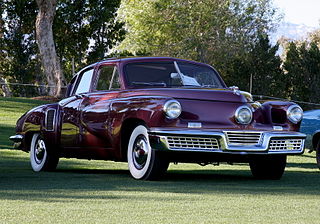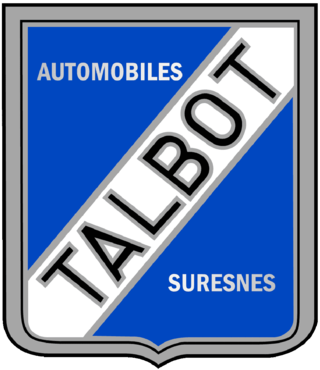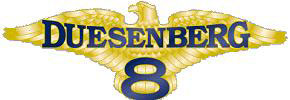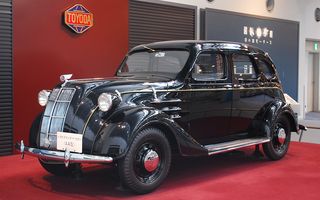
Buick is a division of the American automobile manufacturer General Motors (GM). Started by automotive pioneer David Dunbar Buick in 1899, it was among the first American automobile brands and was the company that established General Motors in 1908. Before the establishment of General Motors, GM founder William C. Durant had served as Buick's general manager and major investor. With the demise of Oldsmobile in 2004, Buick became the oldest surviving American carmaker.

The Tucker 48, commonly but incorrectly referred to as the Tucker Torpedo, was an automobile conceived by Preston Tucker while in Ypsilanti, Michigan, and briefly produced in Chicago, Illinois, in 1948. Only 51 cars were made including their prototype before the company was forced to declare bankruptcy and cease all operations on March 3, 1949, due to negative publicity initiated by the news media, a Securities and Exchange Commission investigation, and a heavily publicized stock fraud trial. Tucker suspected that the Big Three automakers and Michigan Senator Homer S. Ferguson had a role in the Tucker Corporation's demise.

Cadillac Motor Car Division, or simply Cadillac, is a division of the American automobile manufacturer General Motors (GM) that designs and builds luxury vehicles. Its major markets are the United States, Canada and China. Cadillac models are distributed in 34 additional markets worldwide. Historically, Cadillac automobiles were at the top of the luxury field within the United States, but have been outsold by European luxury brands including BMW and Mercedes since the 2000s. In 2019, Cadillac sold 390,458 vehicles worldwide, a record for the brand.

AC Cars, originally incorporated as Auto Carriers Ltd., is a British specialist automobile manufacturer and one of the oldest independent car makers founded in Britain. As a result of bad financial conditions over the years, the company was renamed or liquidated many times until its latest form. In 2022, the new corporate structure began the production of new AC Cobra models, with a slightly modified structure to adapt it to modern safety and technology requirements and obtain the European road homologation certificate.
Think Global was a Norwegian electric car manufacturer located in Bærum, which manufactured cars under the TH!NK brand. Production of the Think City was stopped in March 2011 and the company filed for bankruptcy on June 22, 2011, for the fourth time in 20 years. The company was bought soon after by Electric Mobility Solutions AS and production ceased in August 2012 with no more announcements regarding future production. As of October 2010, a total of 2,500 units had been manufactured at Oslo-based TH!NK's production facility.

Daihatsu Motor Co., Ltd., commonly known as Daihatsu, is a Japanese automobile manufacturer and one of the oldest surviving Japanese internal combustion engine manufacturers. The company's headquarters are located in Ikeda, Osaka Prefecture.

Lancia is an Italian car manufacturer and a subsidiary of Stellantis Europe, which is currently a Stellantis division. The present legal entity of Lancia was formed in January 2007 when its corporate parent reorganised its businesses, but its history is traced back to Lancia & C., a manufacturing concern founded in 1906 in Torino by Vincenzo Lancia (1881–1937) and Claudio Fogolin. It became part of Fiat in 1969.

A vintage car is, in the most general sense, an old automobile, and in the narrower senses of car enthusiasts and collectors, it is a car from the period of 1919 to 1930. Such enthusiasts have categorization schemes for ages of cars that enforce distinctions between antique cars, vintage cars, classic cars, and so on. The classification criteria vary, but consensus within any country is often maintained by major car clubs, for example the Vintage Sports-Car Club (VSCC) in the UK.

The Porsche 959 is a sports car manufactured by German automobile manufacturer Porsche from 1986 to 1993, first as a Group B rally car and later as a road legal production car designed to satisfy FIA homologation regulations requiring at least 200 units be produced.

Mathis S.A. was an automobile manufacturer in Alsace that produced cars between 1910 and 1950. Founder Émile Mathis (1880–1956) was born in Strasbourg and died in Geneva.

Front-wheel drive (FWD) is a form of engine and transmission layout used in motor vehicles, in which the engine drives the front wheels only. Most modern front-wheel-drive vehicles feature a transverse engine, rather than the conventional longitudinal engine arrangement generally found in rear-wheel-drive and four-wheel-drive vehicles.
Economy car is a term mostly used in the United States for cars designed for low-cost purchase and operation. Typical economy cars are small, lightweight, and inexpensive to both produce and purchase. Stringent design constraints generally force economy car manufacturers to be inventive. Many innovations in automobile design were originally developed for economy cars, such as the Ford Model T and the Austin Mini.

The General Motors EV1 is a battery electric car produced by the American automaker General Motors from 1996 until its demise in 1999.

Talbot-Lago was a French automobile manufacturer based in Suresnes, Hauts de Seine, outside Paris. The company was owned and managed by Antonio Lago, an Italian engineer that acquired rights to the Talbot brand name after the demise of Darracq London's subsidiary Automobiles Talbot France in 1936.

Duesenberg Automobile & Motors Company, Inc. was an American racing and luxury automobile manufacturer founded in Indianapolis, Indiana, by brothers Fred and August Duesenberg in 1920. The company is known for popularizing the straight-eight engine and four-wheel hydraulic brakes. A Duesenberg car was the first American car to win a Grand Prix race, winning the 1921 French Grand Prix. Duesenbergs won the Indianapolis 500 in 1922, 1924, 1925 and 1927. Transportation executive Errett Lobban Cord acquired the Duesenberg corporation in 1926. The company was sold and dissolved in 1937.

The Twentieth Century Motor Car Corporation was an American automobile company started by Geraldine Elizabeth "Liz" Carmichael, in 1974, incorporated in Nevada. The company's flagship vehicle was the Dale, a prototype three-wheeled two-seater automobile designed and built by Dale Clifft. It was touted as being powered by an 850 cc air-cooled engine and featuring 70 mpg‑US fuel economy and a $2,000 price, which were popular specifications during the mid 1970s US fuel crisis.

The A1 was the first prototype passenger car built by the company that became Toyota. It was redesigned and put into production as Toyota's first production cars, the AA sedan and the AB cabriolet. These were succeeded by the similar AE, AC and BA sedans.

The Davis Divan is a three-wheeled convertible built by the Davis Motorcar Company between 1947 and 1949. The brainchild of used-car salesman Glen Gordon "Gary" Davis, it was largely based upon "The Californian", a custom three-wheeled roadster built by future Indianapolis 500 racing car designer Frank Kurtis for Southern Californian millionaire and racer Joel Thorne. After building two prototypes in 1947, Davis embarked on an aggressive publicity and promotional campaign for the car, which included numerous magazine appearances, a lavish public unveiling at the Ambassador Hotel in Los Angeles, and a promotional trip across the United States.

Uniti was an electric vehicle prototype by Uniti Sweden, a Swedish automotive startup. The company was founded in January 2016 by a team of students and engineers under CEO Lewis Horne which aimed at developing an electric microcar in Lund, Sweden. It filed for bankruptcy in April 2022. No products were ever delivered to customers.

Stellantis N.V. is a multinational automotive manufacturing corporation formed from the merger in 2021 of the Italian–American conglomerate Fiat Chrysler Automobiles (FCA) and the French PSA Group. The company headquarters is in Hoofddorp, Netherlands.




















